Entrepreneurship and Small Business Management Analysis Report, UK
VerifiedAdded on 2020/10/05
|18
|5650
|197
Report
AI Summary
This report provides an in-depth analysis of entrepreneurship and small business management, focusing on the importance of these entities in economic and social development, particularly within the context of the UK. The report explores different types of entrepreneurial ventures, including large-scale enterprises, small-scale enterprises, social enterprises, and scalable start-ups, highlighting their similarities, differences, and typologies. It also delves into the impact of micro and small businesses on the economy, emphasizing their role in job creation, innovation, and financial independence. Furthermore, the report discusses the entrepreneurial mindset, its motivational drivers, and the environmental factors that either foster or hinder entrepreneurial activities. The report references the impact of Brexit on the UK's economy and the role of entrepreneurship in recovery.

Entrepreneurship and
Small Business
Management
Small Business
Management
Paraphrase This Document
Need a fresh take? Get an instant paraphrase of this document with our AI Paraphraser

Table of Contents
INTRODUCTION...........................................................................................................................1
TASK 1............................................................................................................................................1
TASK 2............................................................................................................................................5
TASK 3............................................................................................................................................8
TASK 4..........................................................................................................................................10
CONCLUSION..............................................................................................................................11
REFERENCES..............................................................................................................................13
INTRODUCTION...........................................................................................................................1
TASK 1............................................................................................................................................1
TASK 2............................................................................................................................................5
TASK 3............................................................................................................................................8
TASK 4..........................................................................................................................................10
CONCLUSION..............................................................................................................................11
REFERENCES..............................................................................................................................13
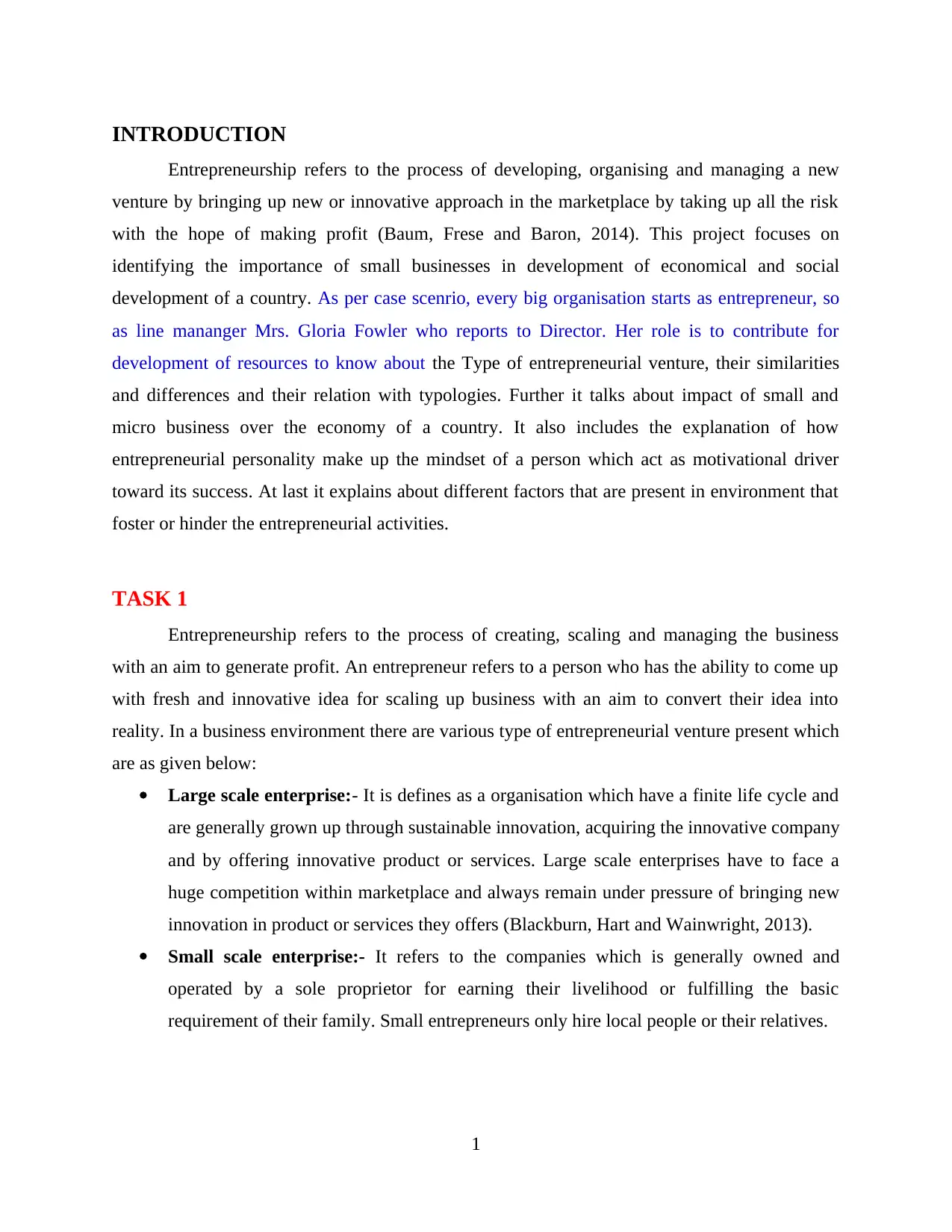
INTRODUCTION
Entrepreneurship refers to the process of developing, organising and managing a new
venture by bringing up new or innovative approach in the marketplace by taking up all the risk
with the hope of making profit (Baum, Frese and Baron, 2014). This project focuses on
identifying the importance of small businesses in development of economical and social
development of a country. As per case scenrio, every big organisation starts as entrepreneur, so
as line mananger Mrs. Gloria Fowler who reports to Director. Her role is to contribute for
development of resources to know about the Type of entrepreneurial venture, their similarities
and differences and their relation with typologies. Further it talks about impact of small and
micro business over the economy of a country. It also includes the explanation of how
entrepreneurial personality make up the mindset of a person which act as motivational driver
toward its success. At last it explains about different factors that are present in environment that
foster or hinder the entrepreneurial activities.
TASK 1
Entrepreneurship refers to the process of creating, scaling and managing the business
with an aim to generate profit. An entrepreneur refers to a person who has the ability to come up
with fresh and innovative idea for scaling up business with an aim to convert their idea into
reality. In a business environment there are various type of entrepreneurial venture present which
are as given below:
Large scale enterprise:- It is defines as a organisation which have a finite life cycle and
are generally grown up through sustainable innovation, acquiring the innovative company
and by offering innovative product or services. Large scale enterprises have to face a
huge competition within marketplace and always remain under pressure of bringing new
innovation in product or services they offers (Blackburn, Hart and Wainwright, 2013).
Small scale enterprise:- It refers to the companies which is generally owned and
operated by a sole proprietor for earning their livelihood or fulfilling the basic
requirement of their family. Small entrepreneurs only hire local people or their relatives.
1
Entrepreneurship refers to the process of developing, organising and managing a new
venture by bringing up new or innovative approach in the marketplace by taking up all the risk
with the hope of making profit (Baum, Frese and Baron, 2014). This project focuses on
identifying the importance of small businesses in development of economical and social
development of a country. As per case scenrio, every big organisation starts as entrepreneur, so
as line mananger Mrs. Gloria Fowler who reports to Director. Her role is to contribute for
development of resources to know about the Type of entrepreneurial venture, their similarities
and differences and their relation with typologies. Further it talks about impact of small and
micro business over the economy of a country. It also includes the explanation of how
entrepreneurial personality make up the mindset of a person which act as motivational driver
toward its success. At last it explains about different factors that are present in environment that
foster or hinder the entrepreneurial activities.
TASK 1
Entrepreneurship refers to the process of creating, scaling and managing the business
with an aim to generate profit. An entrepreneur refers to a person who has the ability to come up
with fresh and innovative idea for scaling up business with an aim to convert their idea into
reality. In a business environment there are various type of entrepreneurial venture present which
are as given below:
Large scale enterprise:- It is defines as a organisation which have a finite life cycle and
are generally grown up through sustainable innovation, acquiring the innovative company
and by offering innovative product or services. Large scale enterprises have to face a
huge competition within marketplace and always remain under pressure of bringing new
innovation in product or services they offers (Blackburn, Hart and Wainwright, 2013).
Small scale enterprise:- It refers to the companies which is generally owned and
operated by a sole proprietor for earning their livelihood or fulfilling the basic
requirement of their family. Small entrepreneurs only hire local people or their relatives.
1
⊘ This is a preview!⊘
Do you want full access?
Subscribe today to unlock all pages.

Trusted by 1+ million students worldwide
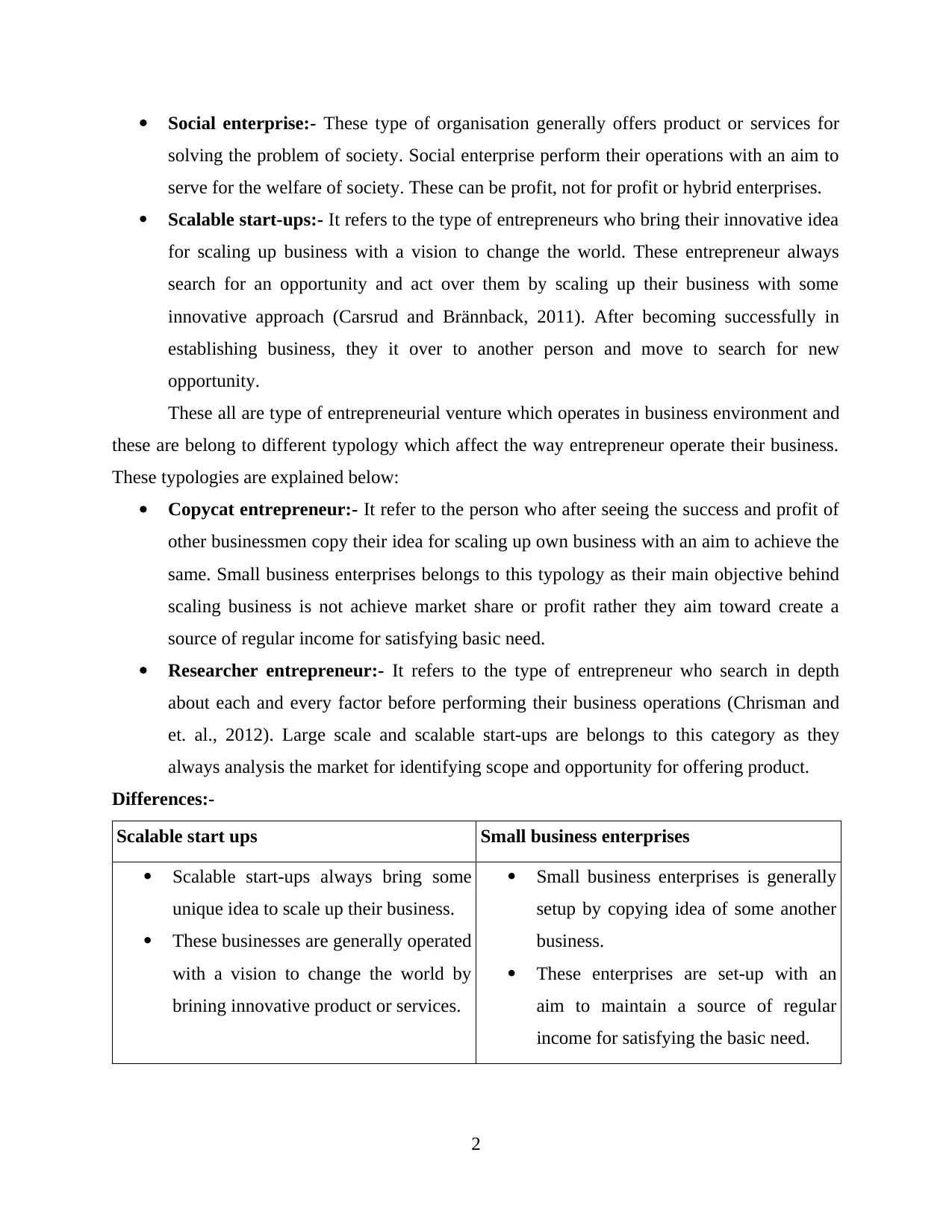
Social enterprise:- These type of organisation generally offers product or services for
solving the problem of society. Social enterprise perform their operations with an aim to
serve for the welfare of society. These can be profit, not for profit or hybrid enterprises.
Scalable start-ups:- It refers to the type of entrepreneurs who bring their innovative idea
for scaling up business with a vision to change the world. These entrepreneur always
search for an opportunity and act over them by scaling up their business with some
innovative approach (Carsrud and Brännback, 2011). After becoming successfully in
establishing business, they it over to another person and move to search for new
opportunity.
These all are type of entrepreneurial venture which operates in business environment and
these are belong to different typology which affect the way entrepreneur operate their business.
These typologies are explained below:
Copycat entrepreneur:- It refer to the person who after seeing the success and profit of
other businessmen copy their idea for scaling up own business with an aim to achieve the
same. Small business enterprises belongs to this typology as their main objective behind
scaling business is not achieve market share or profit rather they aim toward create a
source of regular income for satisfying basic need.
Researcher entrepreneur:- It refers to the type of entrepreneur who search in depth
about each and every factor before performing their business operations (Chrisman and
et. al., 2012). Large scale and scalable start-ups are belongs to this category as they
always analysis the market for identifying scope and opportunity for offering product.
Differences:-
Scalable start ups Small business enterprises
Scalable start-ups always bring some
unique idea to scale up their business.
These businesses are generally operated
with a vision to change the world by
brining innovative product or services.
Small business enterprises is generally
setup by copying idea of some another
business.
These enterprises are set-up with an
aim to maintain a source of regular
income for satisfying the basic need.
2
solving the problem of society. Social enterprise perform their operations with an aim to
serve for the welfare of society. These can be profit, not for profit or hybrid enterprises.
Scalable start-ups:- It refers to the type of entrepreneurs who bring their innovative idea
for scaling up business with a vision to change the world. These entrepreneur always
search for an opportunity and act over them by scaling up their business with some
innovative approach (Carsrud and Brännback, 2011). After becoming successfully in
establishing business, they it over to another person and move to search for new
opportunity.
These all are type of entrepreneurial venture which operates in business environment and
these are belong to different typology which affect the way entrepreneur operate their business.
These typologies are explained below:
Copycat entrepreneur:- It refer to the person who after seeing the success and profit of
other businessmen copy their idea for scaling up own business with an aim to achieve the
same. Small business enterprises belongs to this typology as their main objective behind
scaling business is not achieve market share or profit rather they aim toward create a
source of regular income for satisfying basic need.
Researcher entrepreneur:- It refers to the type of entrepreneur who search in depth
about each and every factor before performing their business operations (Chrisman and
et. al., 2012). Large scale and scalable start-ups are belongs to this category as they
always analysis the market for identifying scope and opportunity for offering product.
Differences:-
Scalable start ups Small business enterprises
Scalable start-ups always bring some
unique idea to scale up their business.
These businesses are generally operated
with a vision to change the world by
brining innovative product or services.
Small business enterprises is generally
setup by copying idea of some another
business.
These enterprises are set-up with an
aim to maintain a source of regular
income for satisfying the basic need.
2
Paraphrase This Document
Need a fresh take? Get an instant paraphrase of this document with our AI Paraphraser
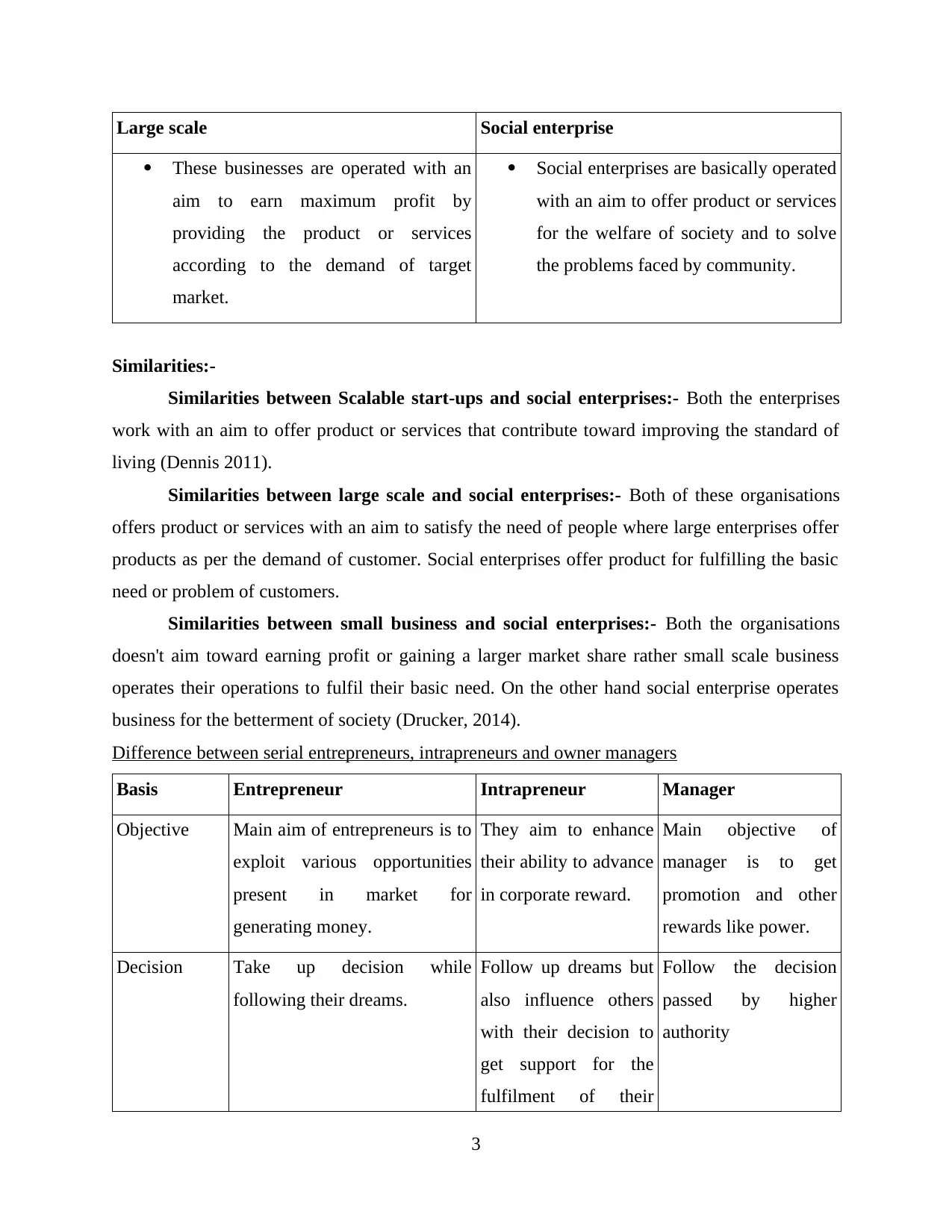
Large scale Social enterprise
These businesses are operated with an
aim to earn maximum profit by
providing the product or services
according to the demand of target
market.
Social enterprises are basically operated
with an aim to offer product or services
for the welfare of society and to solve
the problems faced by community.
Similarities:-
Similarities between Scalable start-ups and social enterprises:- Both the enterprises
work with an aim to offer product or services that contribute toward improving the standard of
living (Dennis 2011).
Similarities between large scale and social enterprises:- Both of these organisations
offers product or services with an aim to satisfy the need of people where large enterprises offer
products as per the demand of customer. Social enterprises offer product for fulfilling the basic
need or problem of customers.
Similarities between small business and social enterprises:- Both the organisations
doesn't aim toward earning profit or gaining a larger market share rather small scale business
operates their operations to fulfil their basic need. On the other hand social enterprise operates
business for the betterment of society (Drucker, 2014).
Difference between serial entrepreneurs, intrapreneurs and owner managers
Basis Entrepreneur Intrapreneur Manager
Objective Main aim of entrepreneurs is to
exploit various opportunities
present in market for
generating money.
They aim to enhance
their ability to advance
in corporate reward.
Main objective of
manager is to get
promotion and other
rewards like power.
Decision Take up decision while
following their dreams.
Follow up dreams but
also influence others
with their decision to
get support for the
fulfilment of their
Follow the decision
passed by higher
authority
3
These businesses are operated with an
aim to earn maximum profit by
providing the product or services
according to the demand of target
market.
Social enterprises are basically operated
with an aim to offer product or services
for the welfare of society and to solve
the problems faced by community.
Similarities:-
Similarities between Scalable start-ups and social enterprises:- Both the enterprises
work with an aim to offer product or services that contribute toward improving the standard of
living (Dennis 2011).
Similarities between large scale and social enterprises:- Both of these organisations
offers product or services with an aim to satisfy the need of people where large enterprises offer
products as per the demand of customer. Social enterprises offer product for fulfilling the basic
need or problem of customers.
Similarities between small business and social enterprises:- Both the organisations
doesn't aim toward earning profit or gaining a larger market share rather small scale business
operates their operations to fulfil their basic need. On the other hand social enterprise operates
business for the betterment of society (Drucker, 2014).
Difference between serial entrepreneurs, intrapreneurs and owner managers
Basis Entrepreneur Intrapreneur Manager
Objective Main aim of entrepreneurs is to
exploit various opportunities
present in market for
generating money.
They aim to enhance
their ability to advance
in corporate reward.
Main objective of
manager is to get
promotion and other
rewards like power.
Decision Take up decision while
following their dreams.
Follow up dreams but
also influence others
with their decision to
get support for the
fulfilment of their
Follow the decision
passed by higher
authority
3
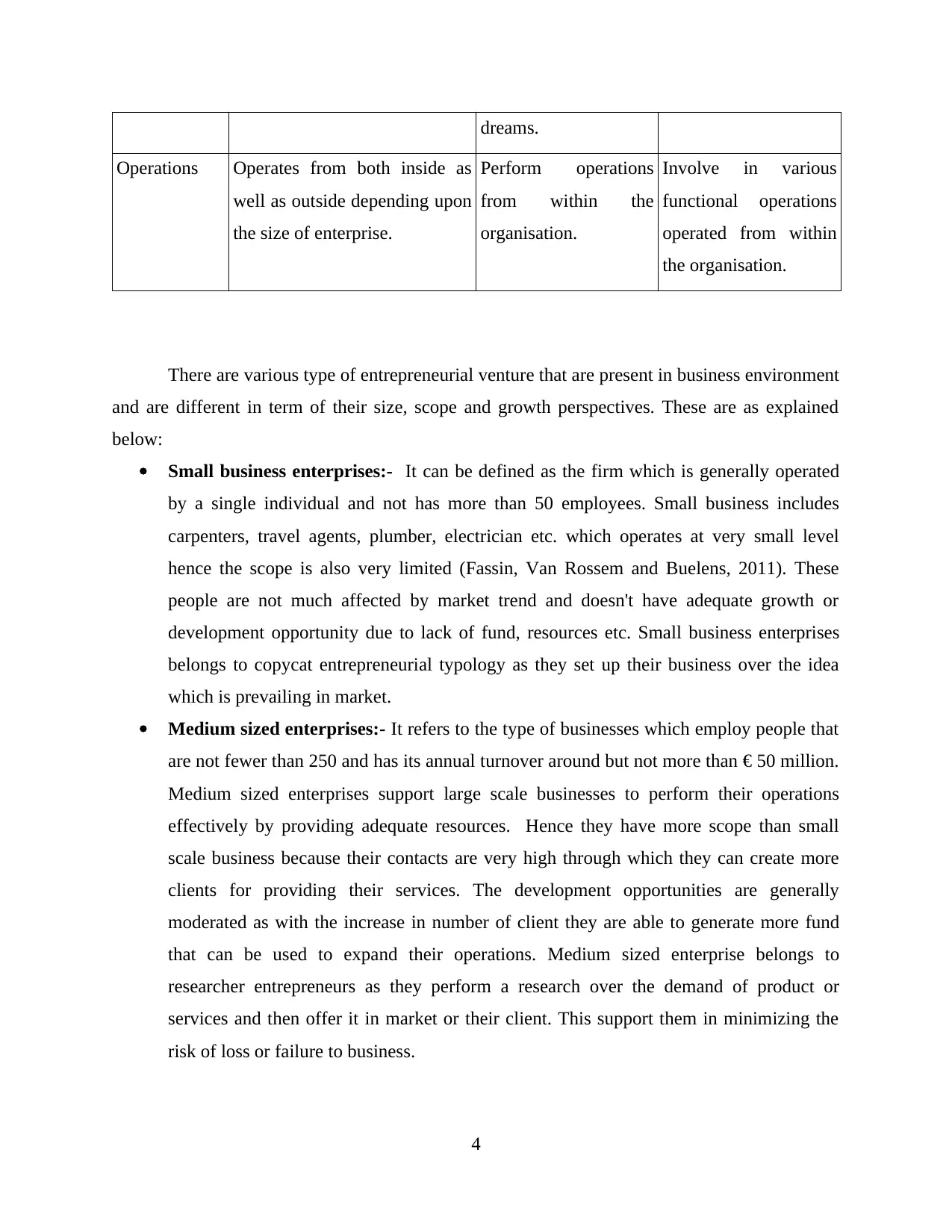
dreams.
Operations Operates from both inside as
well as outside depending upon
the size of enterprise.
Perform operations
from within the
organisation.
Involve in various
functional operations
operated from within
the organisation.
There are various type of entrepreneurial venture that are present in business environment
and are different in term of their size, scope and growth perspectives. These are as explained
below:
Small business enterprises:- It can be defined as the firm which is generally operated
by a single individual and not has more than 50 employees. Small business includes
carpenters, travel agents, plumber, electrician etc. which operates at very small level
hence the scope is also very limited (Fassin, Van Rossem and Buelens, 2011). These
people are not much affected by market trend and doesn't have adequate growth or
development opportunity due to lack of fund, resources etc. Small business enterprises
belongs to copycat entrepreneurial typology as they set up their business over the idea
which is prevailing in market.
Medium sized enterprises:- It refers to the type of businesses which employ people that
are not fewer than 250 and has its annual turnover around but not more than € 50 million.
Medium sized enterprises support large scale businesses to perform their operations
effectively by providing adequate resources. Hence they have more scope than small
scale business because their contacts are very high through which they can create more
clients for providing their services. The development opportunities are generally
moderated as with the increase in number of client they are able to generate more fund
that can be used to expand their operations. Medium sized enterprise belongs to
researcher entrepreneurs as they perform a research over the demand of product or
services and then offer it in market or their client. This support them in minimizing the
risk of loss or failure to business.
4
Operations Operates from both inside as
well as outside depending upon
the size of enterprise.
Perform operations
from within the
organisation.
Involve in various
functional operations
operated from within
the organisation.
There are various type of entrepreneurial venture that are present in business environment
and are different in term of their size, scope and growth perspectives. These are as explained
below:
Small business enterprises:- It can be defined as the firm which is generally operated
by a single individual and not has more than 50 employees. Small business includes
carpenters, travel agents, plumber, electrician etc. which operates at very small level
hence the scope is also very limited (Fassin, Van Rossem and Buelens, 2011). These
people are not much affected by market trend and doesn't have adequate growth or
development opportunity due to lack of fund, resources etc. Small business enterprises
belongs to copycat entrepreneurial typology as they set up their business over the idea
which is prevailing in market.
Medium sized enterprises:- It refers to the type of businesses which employ people that
are not fewer than 250 and has its annual turnover around but not more than € 50 million.
Medium sized enterprises support large scale businesses to perform their operations
effectively by providing adequate resources. Hence they have more scope than small
scale business because their contacts are very high through which they can create more
clients for providing their services. The development opportunities are generally
moderated as with the increase in number of client they are able to generate more fund
that can be used to expand their operations. Medium sized enterprise belongs to
researcher entrepreneurs as they perform a research over the demand of product or
services and then offer it in market or their client. This support them in minimizing the
risk of loss or failure to business.
4
⊘ This is a preview!⊘
Do you want full access?
Subscribe today to unlock all pages.

Trusted by 1+ million students worldwide
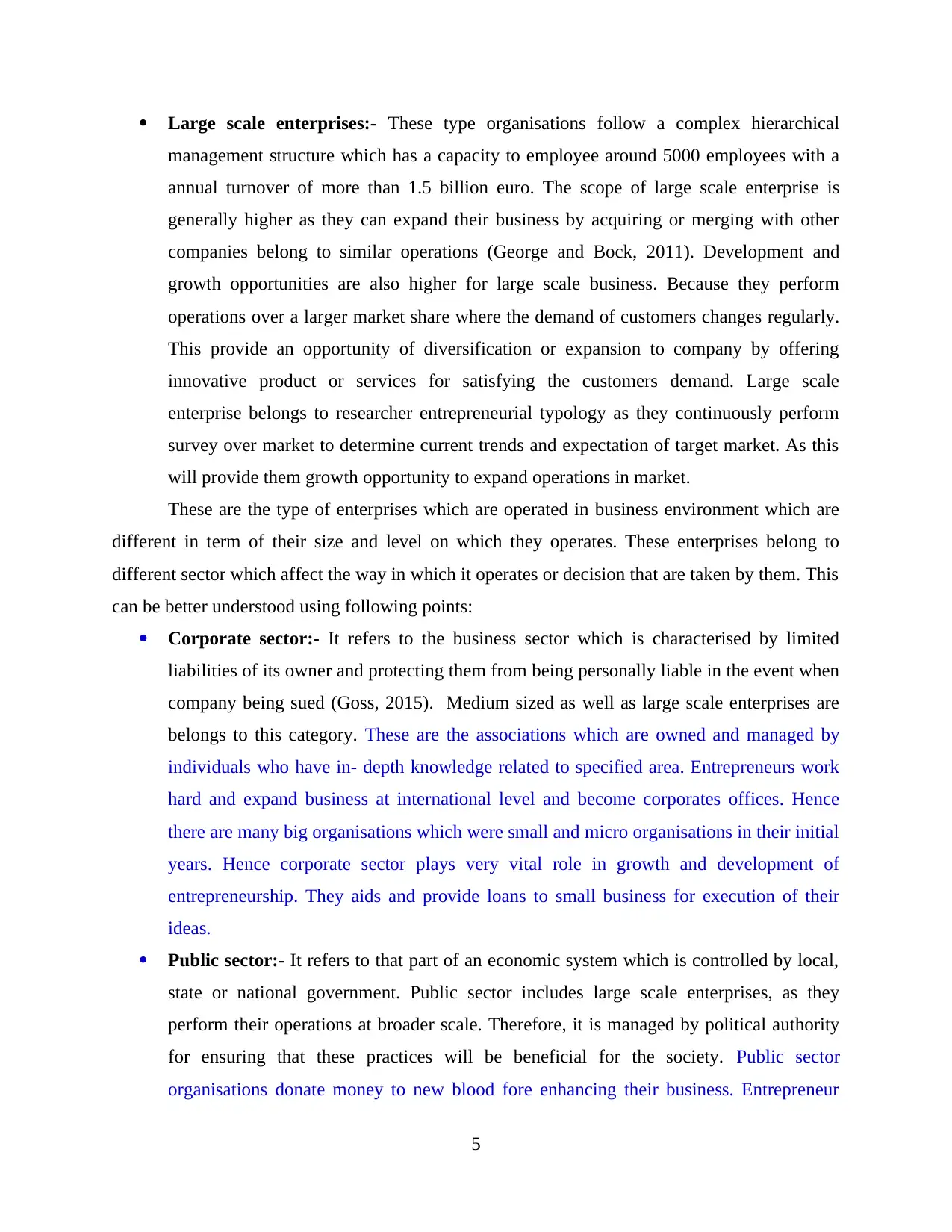
Large scale enterprises:- These type organisations follow a complex hierarchical
management structure which has a capacity to employee around 5000 employees with a
annual turnover of more than 1.5 billion euro. The scope of large scale enterprise is
generally higher as they can expand their business by acquiring or merging with other
companies belong to similar operations (George and Bock, 2011). Development and
growth opportunities are also higher for large scale business. Because they perform
operations over a larger market share where the demand of customers changes regularly.
This provide an opportunity of diversification or expansion to company by offering
innovative product or services for satisfying the customers demand. Large scale
enterprise belongs to researcher entrepreneurial typology as they continuously perform
survey over market to determine current trends and expectation of target market. As this
will provide them growth opportunity to expand operations in market.
These are the type of enterprises which are operated in business environment which are
different in term of their size and level on which they operates. These enterprises belong to
different sector which affect the way in which it operates or decision that are taken by them. This
can be better understood using following points:
Corporate sector:- It refers to the business sector which is characterised by limited
liabilities of its owner and protecting them from being personally liable in the event when
company being sued (Goss, 2015). Medium sized as well as large scale enterprises are
belongs to this category. These are the associations which are owned and managed by
individuals who have in- depth knowledge related to specified area. Entrepreneurs work
hard and expand business at international level and become corporates offices. Hence
there are many big organisations which were small and micro organisations in their initial
years. Hence corporate sector plays very vital role in growth and development of
entrepreneurship. They aids and provide loans to small business for execution of their
ideas.
Public sector:- It refers to that part of an economic system which is controlled by local,
state or national government. Public sector includes large scale enterprises, as they
perform their operations at broader scale. Therefore, it is managed by political authority
for ensuring that these practices will be beneficial for the society. Public sector
organisations donate money to new blood fore enhancing their business. Entrepreneur
5
management structure which has a capacity to employee around 5000 employees with a
annual turnover of more than 1.5 billion euro. The scope of large scale enterprise is
generally higher as they can expand their business by acquiring or merging with other
companies belong to similar operations (George and Bock, 2011). Development and
growth opportunities are also higher for large scale business. Because they perform
operations over a larger market share where the demand of customers changes regularly.
This provide an opportunity of diversification or expansion to company by offering
innovative product or services for satisfying the customers demand. Large scale
enterprise belongs to researcher entrepreneurial typology as they continuously perform
survey over market to determine current trends and expectation of target market. As this
will provide them growth opportunity to expand operations in market.
These are the type of enterprises which are operated in business environment which are
different in term of their size and level on which they operates. These enterprises belong to
different sector which affect the way in which it operates or decision that are taken by them. This
can be better understood using following points:
Corporate sector:- It refers to the business sector which is characterised by limited
liabilities of its owner and protecting them from being personally liable in the event when
company being sued (Goss, 2015). Medium sized as well as large scale enterprises are
belongs to this category. These are the associations which are owned and managed by
individuals who have in- depth knowledge related to specified area. Entrepreneurs work
hard and expand business at international level and become corporates offices. Hence
there are many big organisations which were small and micro organisations in their initial
years. Hence corporate sector plays very vital role in growth and development of
entrepreneurship. They aids and provide loans to small business for execution of their
ideas.
Public sector:- It refers to that part of an economic system which is controlled by local,
state or national government. Public sector includes large scale enterprises, as they
perform their operations at broader scale. Therefore, it is managed by political authority
for ensuring that these practices will be beneficial for the society. Public sector
organisations donate money to new blood fore enhancing their business. Entrepreneur
5
Paraphrase This Document
Need a fresh take? Get an instant paraphrase of this document with our AI Paraphraser
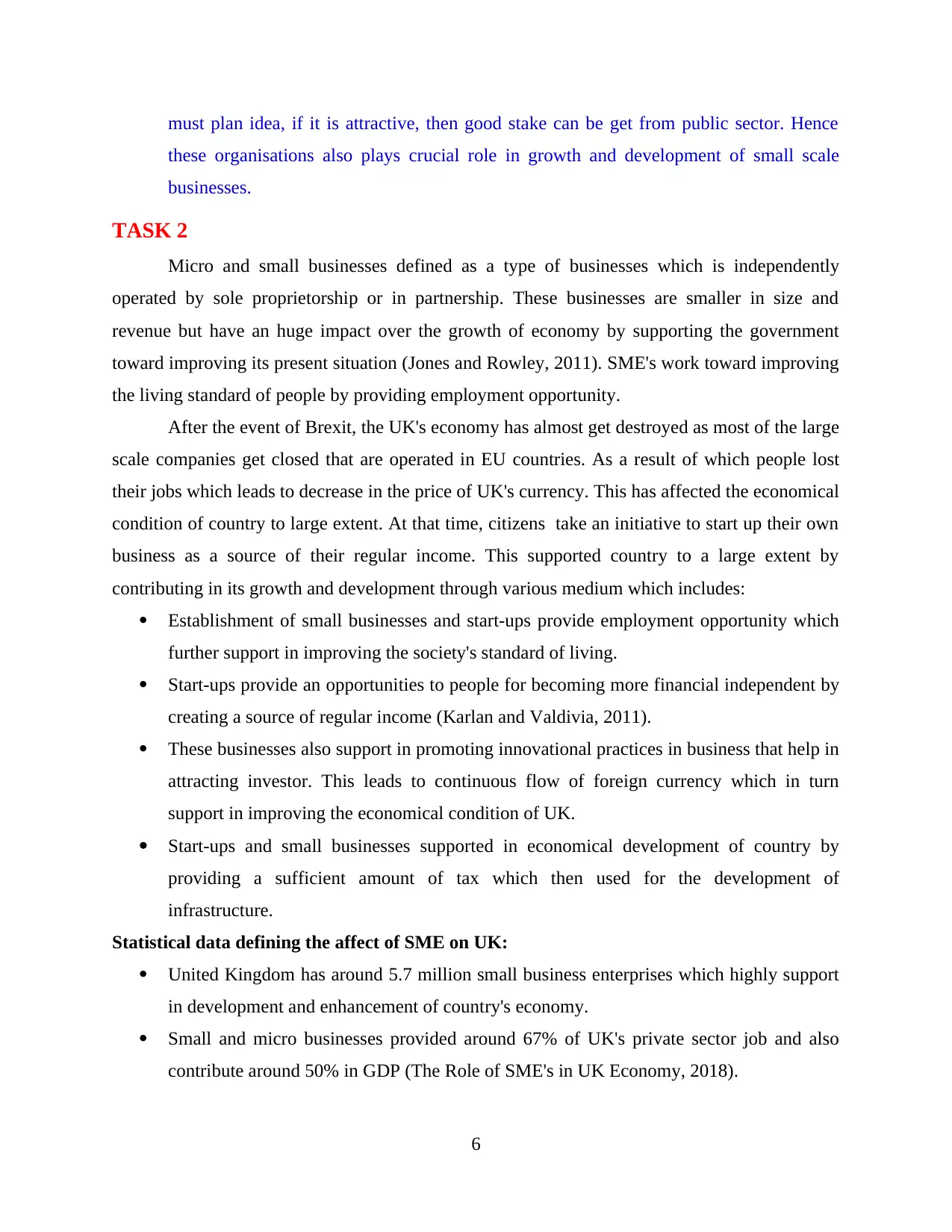
must plan idea, if it is attractive, then good stake can be get from public sector. Hence
these organisations also plays crucial role in growth and development of small scale
businesses.
TASK 2
Micro and small businesses defined as a type of businesses which is independently
operated by sole proprietorship or in partnership. These businesses are smaller in size and
revenue but have an huge impact over the growth of economy by supporting the government
toward improving its present situation (Jones and Rowley, 2011). SME's work toward improving
the living standard of people by providing employment opportunity.
After the event of Brexit, the UK's economy has almost get destroyed as most of the large
scale companies get closed that are operated in EU countries. As a result of which people lost
their jobs which leads to decrease in the price of UK's currency. This has affected the economical
condition of country to large extent. At that time, citizens take an initiative to start up their own
business as a source of their regular income. This supported country to a large extent by
contributing in its growth and development through various medium which includes:
Establishment of small businesses and start-ups provide employment opportunity which
further support in improving the society's standard of living.
Start-ups provide an opportunities to people for becoming more financial independent by
creating a source of regular income (Karlan and Valdivia, 2011).
These businesses also support in promoting innovational practices in business that help in
attracting investor. This leads to continuous flow of foreign currency which in turn
support in improving the economical condition of UK.
Start-ups and small businesses supported in economical development of country by
providing a sufficient amount of tax which then used for the development of
infrastructure.
Statistical data defining the affect of SME on UK:
United Kingdom has around 5.7 million small business enterprises which highly support
in development and enhancement of country's economy.
Small and micro businesses provided around 67% of UK's private sector job and also
contribute around 50% in GDP (The Role of SME's in UK Economy, 2018).
6
these organisations also plays crucial role in growth and development of small scale
businesses.
TASK 2
Micro and small businesses defined as a type of businesses which is independently
operated by sole proprietorship or in partnership. These businesses are smaller in size and
revenue but have an huge impact over the growth of economy by supporting the government
toward improving its present situation (Jones and Rowley, 2011). SME's work toward improving
the living standard of people by providing employment opportunity.
After the event of Brexit, the UK's economy has almost get destroyed as most of the large
scale companies get closed that are operated in EU countries. As a result of which people lost
their jobs which leads to decrease in the price of UK's currency. This has affected the economical
condition of country to large extent. At that time, citizens take an initiative to start up their own
business as a source of their regular income. This supported country to a large extent by
contributing in its growth and development through various medium which includes:
Establishment of small businesses and start-ups provide employment opportunity which
further support in improving the society's standard of living.
Start-ups provide an opportunities to people for becoming more financial independent by
creating a source of regular income (Karlan and Valdivia, 2011).
These businesses also support in promoting innovational practices in business that help in
attracting investor. This leads to continuous flow of foreign currency which in turn
support in improving the economical condition of UK.
Start-ups and small businesses supported in economical development of country by
providing a sufficient amount of tax which then used for the development of
infrastructure.
Statistical data defining the affect of SME on UK:
United Kingdom has around 5.7 million small business enterprises which highly support
in development and enhancement of country's economy.
Small and micro businesses provided around 67% of UK's private sector job and also
contribute around 50% in GDP (The Role of SME's in UK Economy, 2018).
6
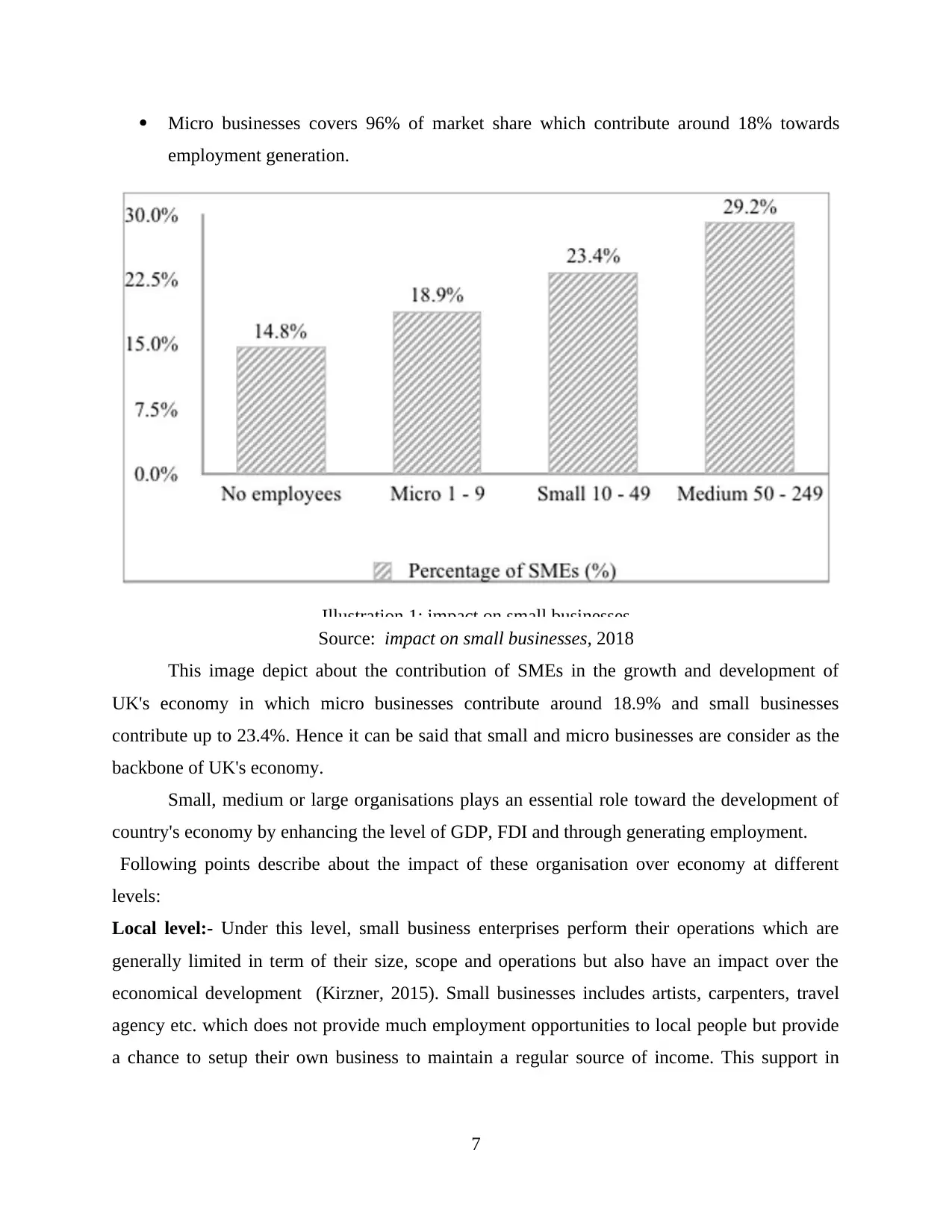
Micro businesses covers 96% of market share which contribute around 18% towards
employment generation.
Illustration 1: impact on small businesses
Source: impact on small businesses, 2018
This image depict about the contribution of SMEs in the growth and development of
UK's economy in which micro businesses contribute around 18.9% and small businesses
contribute up to 23.4%. Hence it can be said that small and micro businesses are consider as the
backbone of UK's economy.
Small, medium or large organisations plays an essential role toward the development of
country's economy by enhancing the level of GDP, FDI and through generating employment.
Following points describe about the impact of these organisation over economy at different
levels:
Local level:- Under this level, small business enterprises perform their operations which are
generally limited in term of their size, scope and operations but also have an impact over the
economical development (Kirzner, 2015). Small businesses includes artists, carpenters, travel
agency etc. which does not provide much employment opportunities to local people but provide
a chance to setup their own business to maintain a regular source of income. This support in
7
employment generation.
Illustration 1: impact on small businesses
Source: impact on small businesses, 2018
This image depict about the contribution of SMEs in the growth and development of
UK's economy in which micro businesses contribute around 18.9% and small businesses
contribute up to 23.4%. Hence it can be said that small and micro businesses are consider as the
backbone of UK's economy.
Small, medium or large organisations plays an essential role toward the development of
country's economy by enhancing the level of GDP, FDI and through generating employment.
Following points describe about the impact of these organisation over economy at different
levels:
Local level:- Under this level, small business enterprises perform their operations which are
generally limited in term of their size, scope and operations but also have an impact over the
economical development (Kirzner, 2015). Small businesses includes artists, carpenters, travel
agency etc. which does not provide much employment opportunities to local people but provide
a chance to setup their own business to maintain a regular source of income. This support in
7
⊘ This is a preview!⊘
Do you want full access?
Subscribe today to unlock all pages.

Trusted by 1+ million students worldwide
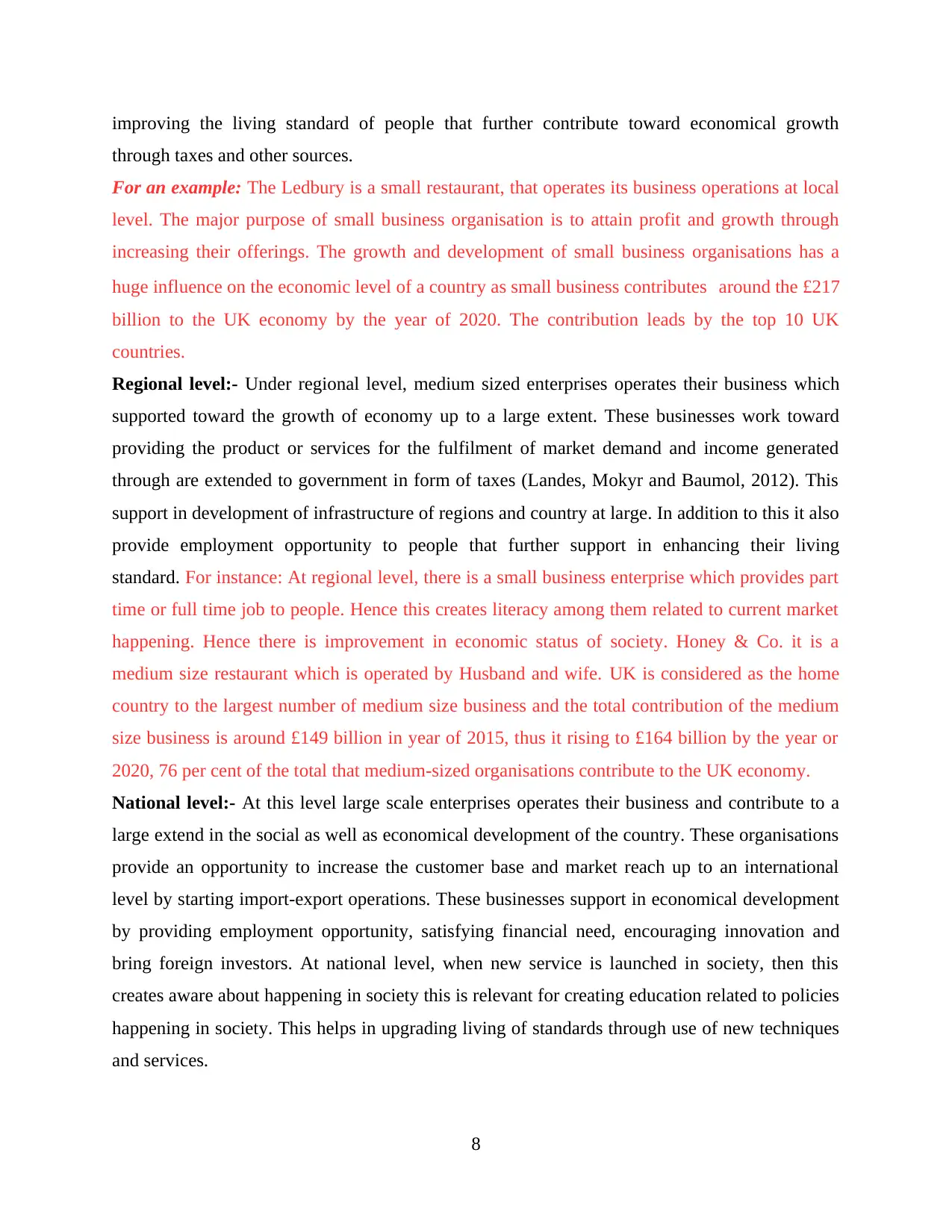
improving the living standard of people that further contribute toward economical growth
through taxes and other sources.
For an example: The Ledbury is a small restaurant, that operates its business operations at local
level. The major purpose of small business organisation is to attain profit and growth through
increasing their offerings. The growth and development of small business organisations has a
huge influence on the economic level of a country as small business contributes around the £217
billion to the UK economy by the year of 2020. The contribution leads by the top 10 UK
countries.
Regional level:- Under regional level, medium sized enterprises operates their business which
supported toward the growth of economy up to a large extent. These businesses work toward
providing the product or services for the fulfilment of market demand and income generated
through are extended to government in form of taxes (Landes, Mokyr and Baumol, 2012). This
support in development of infrastructure of regions and country at large. In addition to this it also
provide employment opportunity to people that further support in enhancing their living
standard. For instance: At regional level, there is a small business enterprise which provides part
time or full time job to people. Hence this creates literacy among them related to current market
happening. Hence there is improvement in economic status of society. Honey & Co. it is a
medium size restaurant which is operated by Husband and wife. UK is considered as the home
country to the largest number of medium size business and the total contribution of the medium
size business is around £149 billion in year of 2015, thus it rising to £164 billion by the year or
2020, 76 per cent of the total that medium-sized organisations contribute to the UK economy.
National level:- At this level large scale enterprises operates their business and contribute to a
large extend in the social as well as economical development of the country. These organisations
provide an opportunity to increase the customer base and market reach up to an international
level by starting import-export operations. These businesses support in economical development
by providing employment opportunity, satisfying financial need, encouraging innovation and
bring foreign investors. At national level, when new service is launched in society, then this
creates aware about happening in society this is relevant for creating education related to policies
happening in society. This helps in upgrading living of standards through use of new techniques
and services.
8
through taxes and other sources.
For an example: The Ledbury is a small restaurant, that operates its business operations at local
level. The major purpose of small business organisation is to attain profit and growth through
increasing their offerings. The growth and development of small business organisations has a
huge influence on the economic level of a country as small business contributes around the £217
billion to the UK economy by the year of 2020. The contribution leads by the top 10 UK
countries.
Regional level:- Under regional level, medium sized enterprises operates their business which
supported toward the growth of economy up to a large extent. These businesses work toward
providing the product or services for the fulfilment of market demand and income generated
through are extended to government in form of taxes (Landes, Mokyr and Baumol, 2012). This
support in development of infrastructure of regions and country at large. In addition to this it also
provide employment opportunity to people that further support in enhancing their living
standard. For instance: At regional level, there is a small business enterprise which provides part
time or full time job to people. Hence this creates literacy among them related to current market
happening. Hence there is improvement in economic status of society. Honey & Co. it is a
medium size restaurant which is operated by Husband and wife. UK is considered as the home
country to the largest number of medium size business and the total contribution of the medium
size business is around £149 billion in year of 2015, thus it rising to £164 billion by the year or
2020, 76 per cent of the total that medium-sized organisations contribute to the UK economy.
National level:- At this level large scale enterprises operates their business and contribute to a
large extend in the social as well as economical development of the country. These organisations
provide an opportunity to increase the customer base and market reach up to an international
level by starting import-export operations. These businesses support in economical development
by providing employment opportunity, satisfying financial need, encouraging innovation and
bring foreign investors. At national level, when new service is launched in society, then this
creates aware about happening in society this is relevant for creating education related to policies
happening in society. This helps in upgrading living of standards through use of new techniques
and services.
8
Paraphrase This Document
Need a fresh take? Get an instant paraphrase of this document with our AI Paraphraser
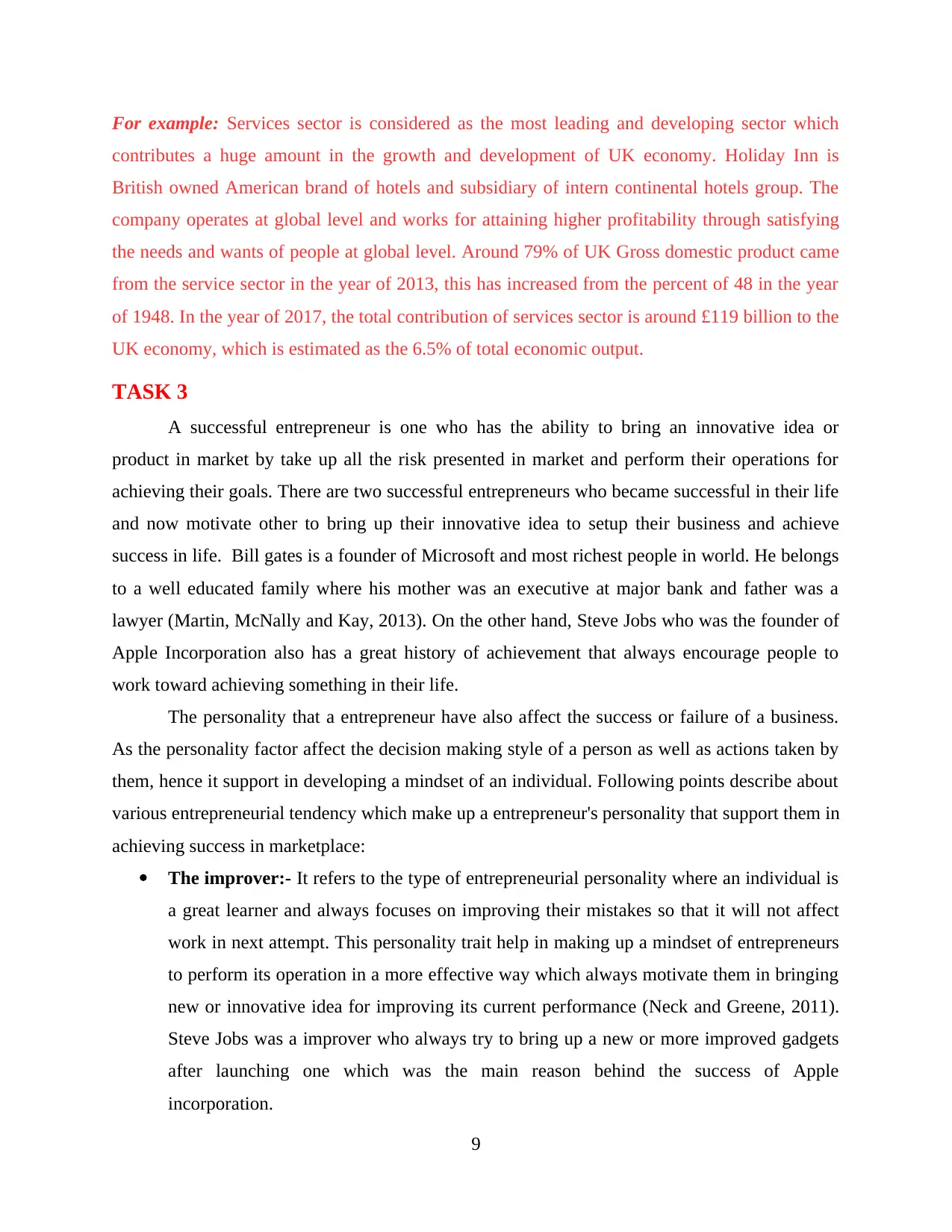
For example: Services sector is considered as the most leading and developing sector which
contributes a huge amount in the growth and development of UK economy. Holiday Inn is
British owned American brand of hotels and subsidiary of intern continental hotels group. The
company operates at global level and works for attaining higher profitability through satisfying
the needs and wants of people at global level. Around 79% of UK Gross domestic product came
from the service sector in the year of 2013, this has increased from the percent of 48 in the year
of 1948. In the year of 2017, the total contribution of services sector is around £119 billion to the
UK economy, which is estimated as the 6.5% of total economic output.
TASK 3
A successful entrepreneur is one who has the ability to bring an innovative idea or
product in market by take up all the risk presented in market and perform their operations for
achieving their goals. There are two successful entrepreneurs who became successful in their life
and now motivate other to bring up their innovative idea to setup their business and achieve
success in life. Bill gates is a founder of Microsoft and most richest people in world. He belongs
to a well educated family where his mother was an executive at major bank and father was a
lawyer (Martin, McNally and Kay, 2013). On the other hand, Steve Jobs who was the founder of
Apple Incorporation also has a great history of achievement that always encourage people to
work toward achieving something in their life.
The personality that a entrepreneur have also affect the success or failure of a business.
As the personality factor affect the decision making style of a person as well as actions taken by
them, hence it support in developing a mindset of an individual. Following points describe about
various entrepreneurial tendency which make up a entrepreneur's personality that support them in
achieving success in marketplace:
The improver:- It refers to the type of entrepreneurial personality where an individual is
a great learner and always focuses on improving their mistakes so that it will not affect
work in next attempt. This personality trait help in making up a mindset of entrepreneurs
to perform its operation in a more effective way which always motivate them in bringing
new or innovative idea for improving its current performance (Neck and Greene, 2011).
Steve Jobs was a improver who always try to bring up a new or more improved gadgets
after launching one which was the main reason behind the success of Apple
incorporation.
9
contributes a huge amount in the growth and development of UK economy. Holiday Inn is
British owned American brand of hotels and subsidiary of intern continental hotels group. The
company operates at global level and works for attaining higher profitability through satisfying
the needs and wants of people at global level. Around 79% of UK Gross domestic product came
from the service sector in the year of 2013, this has increased from the percent of 48 in the year
of 1948. In the year of 2017, the total contribution of services sector is around £119 billion to the
UK economy, which is estimated as the 6.5% of total economic output.
TASK 3
A successful entrepreneur is one who has the ability to bring an innovative idea or
product in market by take up all the risk presented in market and perform their operations for
achieving their goals. There are two successful entrepreneurs who became successful in their life
and now motivate other to bring up their innovative idea to setup their business and achieve
success in life. Bill gates is a founder of Microsoft and most richest people in world. He belongs
to a well educated family where his mother was an executive at major bank and father was a
lawyer (Martin, McNally and Kay, 2013). On the other hand, Steve Jobs who was the founder of
Apple Incorporation also has a great history of achievement that always encourage people to
work toward achieving something in their life.
The personality that a entrepreneur have also affect the success or failure of a business.
As the personality factor affect the decision making style of a person as well as actions taken by
them, hence it support in developing a mindset of an individual. Following points describe about
various entrepreneurial tendency which make up a entrepreneur's personality that support them in
achieving success in marketplace:
The improver:- It refers to the type of entrepreneurial personality where an individual is
a great learner and always focuses on improving their mistakes so that it will not affect
work in next attempt. This personality trait help in making up a mindset of entrepreneurs
to perform its operation in a more effective way which always motivate them in bringing
new or innovative idea for improving its current performance (Neck and Greene, 2011).
Steve Jobs was a improver who always try to bring up a new or more improved gadgets
after launching one which was the main reason behind the success of Apple
incorporation.
9
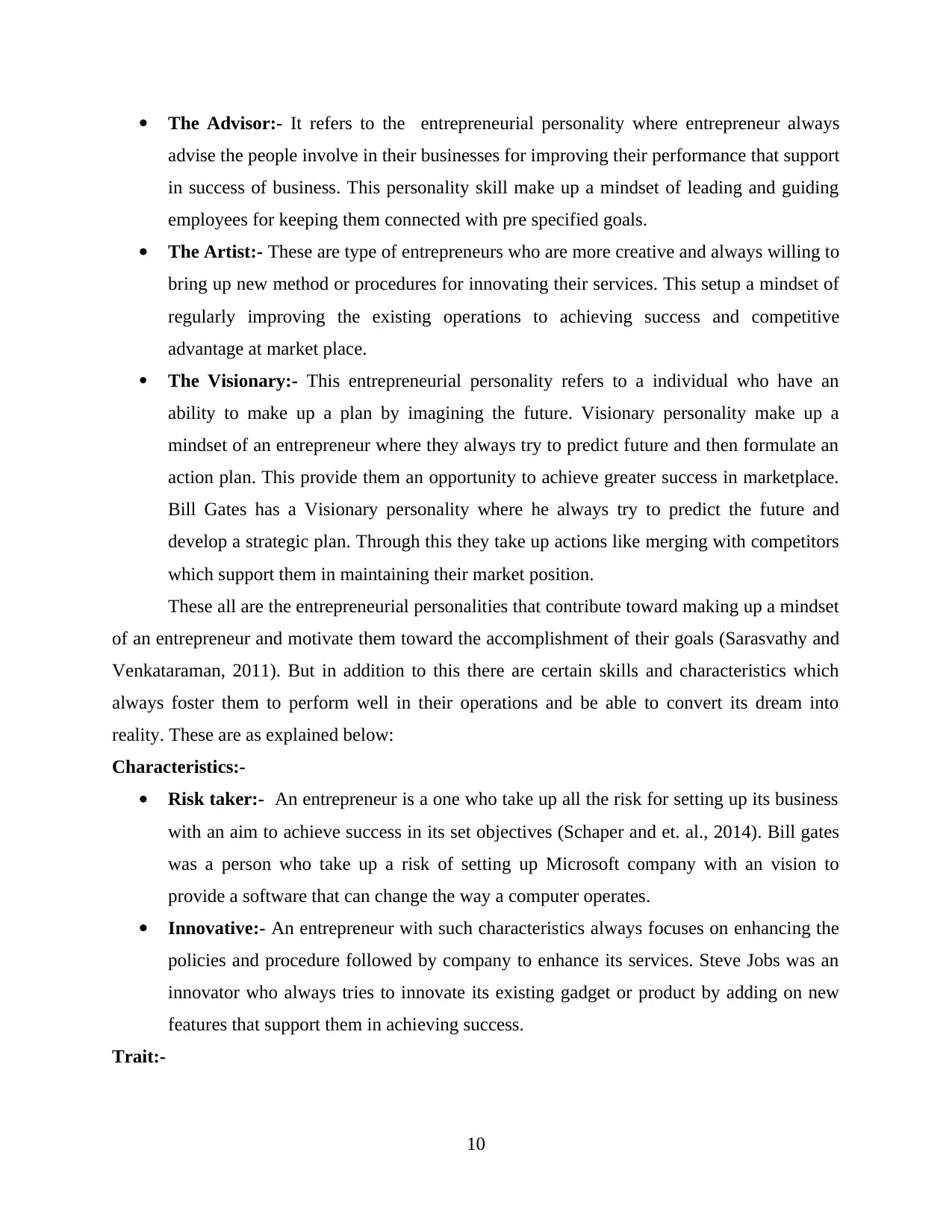
The Advisor:- It refers to the entrepreneurial personality where entrepreneur always
advise the people involve in their businesses for improving their performance that support
in success of business. This personality skill make up a mindset of leading and guiding
employees for keeping them connected with pre specified goals.
The Artist:- These are type of entrepreneurs who are more creative and always willing to
bring up new method or procedures for innovating their services. This setup a mindset of
regularly improving the existing operations to achieving success and competitive
advantage at market place.
The Visionary:- This entrepreneurial personality refers to a individual who have an
ability to make up a plan by imagining the future. Visionary personality make up a
mindset of an entrepreneur where they always try to predict future and then formulate an
action plan. This provide them an opportunity to achieve greater success in marketplace.
Bill Gates has a Visionary personality where he always try to predict the future and
develop a strategic plan. Through this they take up actions like merging with competitors
which support them in maintaining their market position.
These all are the entrepreneurial personalities that contribute toward making up a mindset
of an entrepreneur and motivate them toward the accomplishment of their goals (Sarasvathy and
Venkataraman, 2011). But in addition to this there are certain skills and characteristics which
always foster them to perform well in their operations and be able to convert its dream into
reality. These are as explained below:
Characteristics:-
Risk taker:- An entrepreneur is a one who take up all the risk for setting up its business
with an aim to achieve success in its set objectives (Schaper and et. al., 2014). Bill gates
was a person who take up a risk of setting up Microsoft company with an vision to
provide a software that can change the way a computer operates.
Innovative:- An entrepreneur with such characteristics always focuses on enhancing the
policies and procedure followed by company to enhance its services. Steve Jobs was an
innovator who always tries to innovate its existing gadget or product by adding on new
features that support them in achieving success.
Trait:-
10
advise the people involve in their businesses for improving their performance that support
in success of business. This personality skill make up a mindset of leading and guiding
employees for keeping them connected with pre specified goals.
The Artist:- These are type of entrepreneurs who are more creative and always willing to
bring up new method or procedures for innovating their services. This setup a mindset of
regularly improving the existing operations to achieving success and competitive
advantage at market place.
The Visionary:- This entrepreneurial personality refers to a individual who have an
ability to make up a plan by imagining the future. Visionary personality make up a
mindset of an entrepreneur where they always try to predict future and then formulate an
action plan. This provide them an opportunity to achieve greater success in marketplace.
Bill Gates has a Visionary personality where he always try to predict the future and
develop a strategic plan. Through this they take up actions like merging with competitors
which support them in maintaining their market position.
These all are the entrepreneurial personalities that contribute toward making up a mindset
of an entrepreneur and motivate them toward the accomplishment of their goals (Sarasvathy and
Venkataraman, 2011). But in addition to this there are certain skills and characteristics which
always foster them to perform well in their operations and be able to convert its dream into
reality. These are as explained below:
Characteristics:-
Risk taker:- An entrepreneur is a one who take up all the risk for setting up its business
with an aim to achieve success in its set objectives (Schaper and et. al., 2014). Bill gates
was a person who take up a risk of setting up Microsoft company with an vision to
provide a software that can change the way a computer operates.
Innovative:- An entrepreneur with such characteristics always focuses on enhancing the
policies and procedure followed by company to enhance its services. Steve Jobs was an
innovator who always tries to innovate its existing gadget or product by adding on new
features that support them in achieving success.
Trait:-
10
⊘ This is a preview!⊘
Do you want full access?
Subscribe today to unlock all pages.

Trusted by 1+ million students worldwide
1 out of 18
Related Documents
Your All-in-One AI-Powered Toolkit for Academic Success.
+13062052269
info@desklib.com
Available 24*7 on WhatsApp / Email
![[object Object]](/_next/static/media/star-bottom.7253800d.svg)
Unlock your academic potential
Copyright © 2020–2026 A2Z Services. All Rights Reserved. Developed and managed by ZUCOL.





